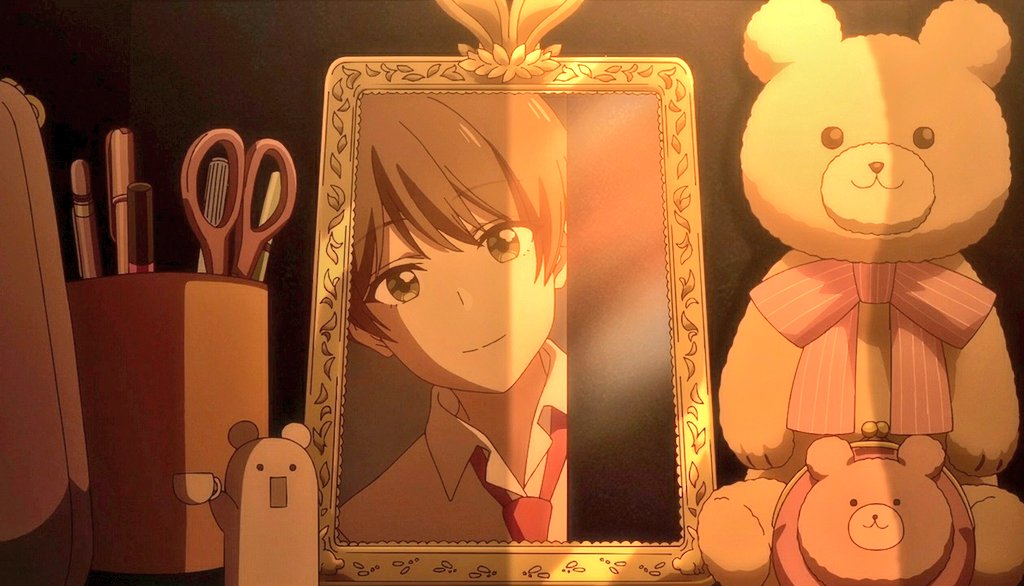Contents
- Introduction
- 1. Acceptance Begins At Home, But It’s Not Always Easy
- 2. True Friendship Sees Beyond The Surface
- 3. Embrace Your Authentic Self, Even When It’s Difficult
- 4. The Impact of Parental Support (or Lack Thereof) on Identity Formation
- 5. Society’s Perception of Gender Is Often Superficial and Limiting
- What do you think?
- About the Writer
Introduction
Senpai wa Otokonoko is a standout anime this season, drawing attention for its serious portrayal of cross-dressing. While gender exploration in anime is not entirely new, this series distinguishes itself by addressing the subject with genuine depth, rather than the comedic or superficial treatment often seen in similar stories. The narrative delves into themes of identity, acceptance, and love, offering a nuanced exploration of gender norms.
At its heart is Makoto Hanaoka, a high school student who defies societal expectations and personal insecurities by embracing a feminine appearance. Rather than merely presenting a romantic tale, this manga imparts valuable life lessons that resonate deeply with its audience. Here are five essential lessons we can learn from Senpai wa Otokonoko:
1. Acceptance Begins At Home, But It’s Not Always Easy

Makoto already has a strong attachment to cute things since childhood, but his mother keeps on denying him that because it is not manly.
One of the most poignant lessons from Senpai wa Otokonoko is the critical role that family acceptance plays in an individual's well-being. Makoto's mother represents a harsh reality for many: a parent’s inability to accept their child's true self. Her homophobia and the resulting mental breakdowns whenever she discovers Makoto's preference for cute and feminine things create a hostile environment at home. This dynamic highlights how crucial it is for families to offer unconditional love and acceptance. When a family member cannot accept a loved one for who they are, it can lead to profound feelings of isolation and self-doubt.

Makoto’s father accepts him and enrolls him in a school where he can finally dress as a girl.
In contrast, Makoto’s father provides a beacon of hope. Despite the societal pressures and his own personal struggles, he chooses to support his son by enrolling him in a school where cross-dressing is accepted. This choice provides Makoto with a space where he can freely express himself without fear of judgment or rejection. Parental support is essential in helping individuals navigate their identity. Even when familial acceptance is challenging, striving to understand and support loved ones can have a transformative impact.
2. True Friendship Sees Beyond The Surface

Ryuji, Makoto and Saki.
Makoto's experiences at school provide more insight into the complexities of friendship and acceptance. Despite not being bullied, Makoto faces significant social challenges, primarily due to his unique style and interests. His friendships with Saki and Ryuji offer a stark contrast to this struggle. Saki, who initially falls in love with Makoto under the assumption that he is a woman, continues to support him even after learning the truth. Her willingness to overlook gender and focus on the person Makoto is demonstrates a profound form of acceptance.

Ryuji and Makoto are childhood friends, while Saki, despite being their junior, easily befriends them.
Similarly, Ryuji’s journey from confusion to understanding reflects the importance of genuine friendship. Initially uncertain about his feelings towards another man, Ryuji's eventual acceptance of Makoto highlights that true friendship and affection are not limited by gender or societal expectations. Authentic friendships are characterized by an ability to see beyond superficial traits and to value individuals for who they are. Saki and Ryuji’s support underscores the importance of having friends who accept and value us in our entirety.
3. Embrace Your Authentic Self, Even When It’s Difficult

Makoto reveals to Saki that he is actually a boy who just likes to dress up as a girl.
Makoto's struggle with his identity is essential to the story and delivers a valuable lesson about self-acceptance. His ability to present as a beautiful woman causes some students at school to forget that he is a man, demonstrating how strong appearances can be in shaping impressions. Despite the comfort that crossdressing provides him, it also presents challenges, such as the fear of being judged or misunderstood.

Makoto has a secret locker in the school premises where he keeps all of his collection of cute things.
This aspect of Makoto’s journey illustrates the importance of embracing one’s authentic self, even in the face of societal pressures and personal insecurities. His courage in continuing to express his identity despite the challenges serves as a powerful reminder that self-acceptance is a worthwhile pursuit. Being true to oneself is essential for personal fulfillment, even when it means facing adversity or navigating difficult social dynamics.
4. The Impact of Parental Support (or Lack Thereof) on Identity Formation

His mother’s breakdown whenever she sees him doing something “girly” is one of the reasons why he hides his cross-dressing self from her.
The contrasting roles of Makoto’s parents offer a deeper understanding of how parental support—or its absence—shapes an individual’s identity. His mother’s rejection forces Makoto to conceal a significant part of himself, contributing to feelings of loneliness and alienation. In contrast, his father’s support provides a safe space for Makoto to explore and express his identity freely.
This dynamic highlights the profound impact that parental attitudes can have on a person’s sense of self. While Makoto’s mother’s rejection creates barriers, his father’s understanding helps to bridge gaps and foster a supportive environment. Parental support is crucial in helping individuals develop a healthy sense of identity. Parents who are open and understanding can provide the encouragement needed for their children to thrive, even when faced with societal challenges.
5. Society’s Perception of Gender Is Often Superficial and Limiting

Saki confessed to Makoto thinking he was a girl—but despite revealing that he is actually a guy, Saki still doesn’t mind.
Senpai wa Otokonoko also challenges conventional notions of gender, emphasizing how societal perceptions can be superficial and limiting. Makoto’s ability to present as a beautiful woman challenges traditional gender norms and reveals the fluidity of identity. The fact that people at school sometimes forget that Makoto is a man underscores how easily society can be swayed by appearances.
This also highlights the danger of reducing individuals to mere stereotypes or appearances. It encourages us to look beyond societal norms and recognize the complexity and uniqueness of each person’s identity. By challenging conventional gender norms, Senpai wa Otokonoko advocates for a more nuanced understanding of gender and identity, urging us to move beyond superficial judgments and appreciate the diverse ways in which people express themselves.

Makoto’s male and female appearance.

The main trio as seen in the manga.
Senpai is an Otokonoko | OFFICIAL TRAILER
テレビアニメ『先輩はおとこのこ』OPムービー|「我がまま」くじら
Senpai wa Otokonoko imparts valuable lessons about acceptance, friendship, self-expression, the significance of parental support, and the challenges posed by societal norms. Makoto’s journey serves as a poignant reminder of the importance of embracing one's true self while encouraging others to do the same. The series’ exploration of these themes offers a meaningful reflection on identity and acceptance, making it a powerful and relevant narrative for readers grappling with their own experiences of gender and self-expression.
Although the anime adaptation is still ongoing, the manga has already concluded with 10 volumes. The manga and other goods are available for purchase at ZenPlus, with shipping directly from Japan!
What do you think?
Will Makoto’s mother ever accept Makoto for who he really is?
Who will get Makoto’s heart in the end: Saki or Ryuji?
Is Makoto trans or is he just a fan of crossdressing?
Let us know in the comments or drop us a line on social media: X (formerly Twitter), Instagram, Facebook! We’d love to hear from you!
ZenPlus is your one-stop shop for all things Japanese. Check out our marketplace for manga volumes, cosplay, figures, and other merch from Senpai wa Otokonoko franchise!
You can watch Senpai wa Otokonoko on Prime Video, Crunchyroll and Netflix.
About the Writer
Cristy is a freelance artist and writer who has been obsessed with anime and manga since childhood. Her love for these imaginative worlds fuels her creative endeavors, and she shows no signs of stopping anytime soon.





